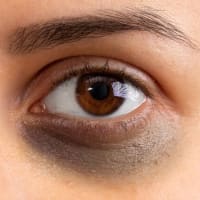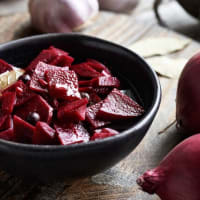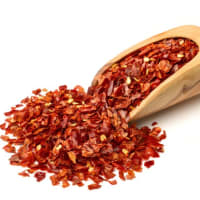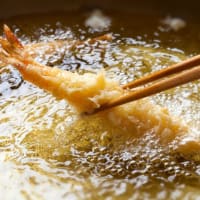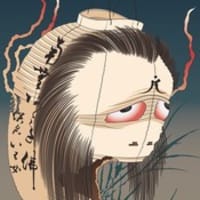As always, Dali and Ina-chan are having a good time at an izakaya.
At the moment, Enka is being played…
いつものようにダリちゃんとイナちゃんは居酒屋で楽しい時間を過ごしている。
その時、演歌が流れている……

Dali Oh, I love this song. I'm nuts about Enka! I'm bananas about Enka!
ダリちゃん おー、わしこの曲好き。演歌にナッツ! 演歌にバナナ!
Me (To izakaya Taisho): Taisho! Mixnuts (mixed nuts) and Banana Chip (banana chips), please!
私 (居酒屋大将に向かって)大将! ミックスナッツとバナナチップ。

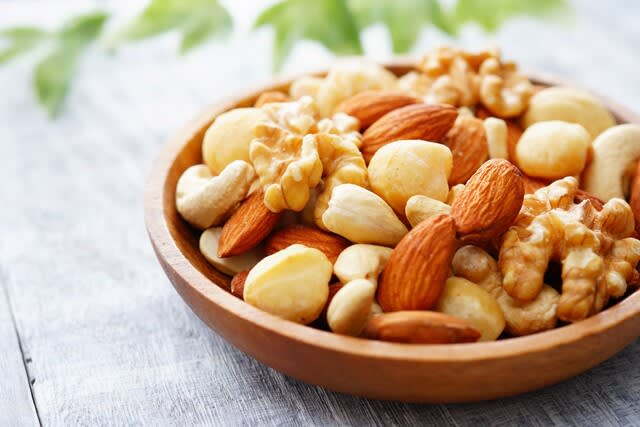

Dali Why did you order that? We never order those things.
ダリちゃん なんでそんなもの頼んだの? わしら絶対頼まないでしょ。
Me Because you asked me to!
私 ダリちゃんが頼めって言ったから。
Dali No! You fool! Every time we meet, I realize again how poor your English is! “Nuts” means “crazy.” And what is interesting is that another food means “crazy”―“bananas.”
ダリちゃん 言ってないよ! バカか! イナちゃんに会った時いつも今更ながら実感するんだけど。英語ひどいね。Nutsてcrazyという意味だよ。面白いことにcrazyを意味するもう一つの食べ物にbananasがあるんだ。
Me What are you talking about?
私 何のこと言ってるの?
Dali In English, we might say, "He's nuts about something. Or "He's bananas about something."
ダリちゃん 英語ではね、わしらはHe’s nuts about somethingやHe’s bananas about somethingて言うんだ。
Me Are they common phrases?
私 よく使うフレーズ?
Dali No, neither one is common. But they are both food expressions that mean "crazy." In my experience, it seems that Japanese people mistakenly feel that the English word "crazy" has a bad meaning. For example, Reiko used to get angry when I told her she was crazy. Maybe she felt insulting, but “crazy” isn't necessarily insulting.
ダリちゃん いや、どちらもよくは使わない。でもどちらもcrazyを意味する食べ物の表現なんだ。わしの経験上、日本人はcrazyの英単語の意味を誤って悪い意味に理解してるみたい。例えば、冷子(ダリちゃんの元妻)は、わしが彼女はcrazyだと言うとよく怒り出したなー。多分バカにされていると感じたんだろうけどcrazyは必ずしもバカにしているというわけではない。
Me Oh, you are crazy!
私 おー、ダリちゃんcrazy!
Dali Thank you. You might even use "crazy" as a compliment. Suppose I took a beautician’s licensure examination and told my friend Porkneck, "I passed the exam with a score of 100." Porkneck might reply, "That's crazy!" Meaning, "I can't believe it!" So, "crazy" here shows surprise and enthusiasm. So "to be nuts about something" means "to be very enthusiastic about an object or activity."
ダリちゃん どうも。Crazyを褒め言葉として使うことさえあるよ。例えばわしが美容師免許の試験を受けて、わしの友達のポークネックに「わしはその試験に満点で合格した」と言ったとする。ポークネックは「ザッツ、クレージー!(信じられない)」と答えるかも。で、ここでのcrazyは驚きや感激を表す。で、to be nuts about somethingは「モノやアクティビティに対してとても熱狂している」という意味。
Me I'm nuts about Burgundy red wine!
私 僕はブルゴーニュワインが大好き!
Dali Yes, good boy! And one more thing. This idiom also describes being in lust with somebody, like "I'm nuts about Ayu." It means that I almost don't think about anything except having sex with Ayu.
ダリちゃん そう。その調子! そしてもう一つ。このイディオムは「誰かとエッチしたい衝動に駆られている」という意味合いもあるんだ。I’m nuts about Ayuという風に。つまりわしは鮎(ダリちゃんの現妻)とセックスすること以外ほとんど何も考えられないという意味。
Keywords(キーワード)
nuts about: ~に夢中である、熱を上げている、にほれ込んでいる、が大好きである
bananas about: 気が狂った、熱狂した
realize: 気付く、悟る、自覚する、実感する
mistakenly: 誤って、間違って
insulting: 侮辱的な、無礼な
compliment: 褒め言葉、賛辞、敬意
beautician: 美容師、美容院経営者
licensure: ライセンス交付、免許下付
enthusiasm: 熱中、熱狂、熱意、感激
Burgundy red wine: ブルゴーニュ赤ワイン
be in lust with somebody: 誰かとの性的衝動に駆られる
refer to: 言及する、参照する、関連付ける
research: 探求、追及、研究、調査
address: 対処する、取り組む
apply to: ~に適応されている、に用いられている
skull: 頭蓋骨、どくろ
upset: 動揺した、取り乱した、具合の悪い
author: 著者、作家、著述家
columnist: (新聞・雑誌などの)特約寄稿家、コラムニスト
myth: 神話、作り話
hallucinogenic: 幻覚を起こさせる
hypothesis: 仮説、仮定、前提
Comments(コメント)
How did the terms “nuts” and “bananas” come to refer to something or someone who was “crazy”? I did some research to address this issue.
People have used “nuts” to mean "crazy" ever since the mid-19th century. The “nut” could be applied to the human skull. Thus, "off the nut" came to mean the status of the skull being separated from the human body, which referred to “a crazy person.” Eventually, "off the nut" was shortened to the current usage of “nuts,” which meant “crazy.”
The story of “bananas” is considerably shorter but more mysterious. The earliest reference to this usage was in 1968 when Kentucky college students used “bananas” to mean "excited or upset." But, unrelated to this, in his 2008 book, Dan Koeppel, the American author and columnist, suggested that "to go bananas" (to become extremely angry or excited) might have arisen from the myth that smoking banana peels would have a hallucinogenic effect. There are many other hypotheses about why “bananas” means "crazy."
Nutsやbananasという単語がどのようにして「crazyな何かや誰か」を指すようになったのだろうか? 僕はこの問題に取り組むべくリサーチした。
人々がnutsをcrazyという意味で使用したのは19世紀半ば以来ずっとだ。Nutはヒトの頭蓋骨に見立てられる。したがってoff the nutは頭蓋骨が人体から切り離された状態を意味するようになり、つまり「気の狂った人」を指すようになった。最終的にoff the nutは現在使われているnutsと短略化されcrazyという意味になった。
Bananasのストーリーはnutsのそれよりずっと短いが、よりミステリアスだ。この言葉が最初に使用されたのは1968年でケンタッキー大学の生徒たちがbananasを「興奮した」や「狼狽した」という意味で使ったことに由来する。しかしこの事とは別に、アメリカ人著述家でコラミスとのダン・キッペルは2008年の著書でto go bananas(烈火のごとく怒り興奮すること)はバナナの皮を燃やして生じる煙には幻覚を生じさせる作用があるという神話からきていたかも知れないと示唆していた。どうしてbananasがcrazyという意味になるかについては他にも多くの仮説が存在する。











